1 Not so happy campers
Campers love good weather. Last May 56% more people turned up at the Camping and Caravanning Club's sites than in 2011, thanks to fine conditions. The opposite happens when it rains. But if there is a cheery side to a decade of wet summers, it might be that we finally hear no more about "glamping". But be warned, we already have "wamping" – wet weather camping.
2 I predict no riots
From the Notting Hill riots to Toxteth, Brixton and of course the UK riots that spread across the country in 2011 – all of them took place in the summer. Some of those involved in the 2011 riots said the rain was a key factor in the unrest ending. So could a decade of damp summers lead to a more peaceful 10 years?
3 A return to cottage gardens
Thought you'd need drought-resistant Mediterranean plants in your plot? Think again. Gardening expert Alys Fowler says there is nothing to fear from unpredictable weather if we grow as wide a variety of plants and vegetables as possible, and perhaps switch from tomatoes, aubergines and bell peppers to tougher veggies such as globe and jerusalem artichokes or rhubarb. Flower-wise, it's back to the English cottage garden with delphiniums and geraniums.
4 Christmas caravans
Forget tents – it's caravans we want. Last summer was a washout, but Christmas bookings for motorhomes and caravan sites went up. The Camping and Caravanning Club reported a 25% increase.
5 Endless mowing (and weeding, and slugs)
Damp summers mean an increase in vegetation growth – so for those who like a tidy lawn, the mower is going to be in constant use, according to Matthew Oates from the National Trust. Nettles, brambles and other "thuggish" vegetation will grow rampantly, to the detriment of shorter, more delicate grasses. There will be more weeds and slugs, who love damp weather, but pesticide sprays and weedkiller will be washed off more easily by the continuous rain – so it'll be harder work for gardeners all round.
6 Bad news for birds and bees
Delicate, warmth-loving winged insects such as butterflies, bees and hoverflies hate the rain because it damages their wings, so they will be less widespread across the country. Instead, they will retreat to safer colonies, such as those in large nature reserves. The animals and birds that feed on them, from bats to swifts and swallows, will also be affected by this loss, says Oates.
7 Kingfishers lose their crowns
If wet summers lead to an increase in flooding, birds and animals who live on sandy riverbanks, including kingfishers and water voles, may drown.
8 Time for Proust
As outdoor fun is washed out, Ella Berthoud, who runs a Bibliotherapy service for the School of Life, suggests we spend the extra time reading – either in book groups, or using those extra days indoors to tackle some long classics, such as Proust. If that sounds too ambitious, try Gerard Woodward's August – a trilogy set over 15 years of annual camping trips in Wales. The Enigma of Arrival by VS Naipaul is another perfect choice that eulogises British drizzle and green hills. If things get really stormy, you could retreat to a rain-battered tent and have a go at Wuthering Heights.
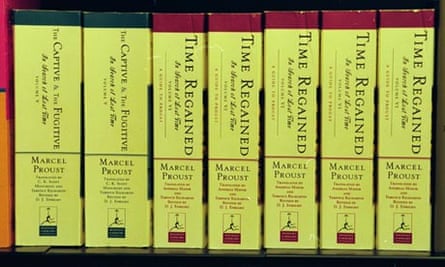
9 Potato and tomato blight
Wet summers are (sadly) good news for diseases in vegetables and fruits – especially blight. Fowler is hoping for an increase in funding for small organisations such as the Sarvari Research Trust, which looks into breeding disease-resistant plants.
10 Return of the mac
Unpredictable weather is already having an impact on fashion and how we dress, according to trend forecaster Lucie Greene, editor of LS:N Global. Brands are focusing more on making macs and lightweight coats: from high-street favourites Uniqlo right up to luxury brands, there has been an increase in layerable separates and breathable, ultra-lightweight, high-tech garments.
11 The end of seasons
Endless winters and washout summers have already taken their toll on the fashion houses' beloved "seasons". As a result, brands are increasingly going seasonless, says Greene, instead stocking key wardrobe pieces all year round.
12 The retail effect
Last year's wet summer hampered sales for many retailers, as shoppers stayed away from the high street. "Retailers will always be hoping for 'seasonally appropriate' weather – cold and wet in winter; warm and dry in spring and summer – as it helps them to deliver against expectations," says a spokesperson for the British Retail Consortium. "But retailers are well adjusted to the UK's topsy-turvy temperatures and will plan ahead as well as they can to give customers a good deal of what they want, whatever the weather."
13 Love film
Good news for cinemas. The first hot weekend is a bad time for the box office, according to Charles Gant, film editor of Heat magazine. The idea of a summer blockbuster is a US import from areas where the air-conditioned comfort of a dark movie theatre is a necessity on stifling days – our damp summers may give it even greater resonance. But forget films al fresco. It's over.
14 Empty stately homes?
Last year the bad weather had a dire effect on the country's outdoor attractions, according to the Association of Leading Visitor Attractions, which looks after everything from Blenheim Palace to Whipsnade Zoo: 33 of their top attractions saw a 10% dip in numbers, with zoos, stately homes and gardens all affected. "Ten years of the kind of weather we had last year is alarming," says the association's Bernard Donoghue.
15 Farewell strappy sandals, hello wellies
Already a staple of summer festival fashion, a decade of rainy years would cement them as the shoe of the season. Last year B&Q's sales of garden footwear such as wellington boots and rubber shoes rose by 97%, and between May and July, Shoe Zone sold more than 115,000 pairs of wellies.
16 Museums and galleries are winners
The good news for local tourism is that people head inside when the weather is bad, and even bored children unable to play outside will, hopefully, be more open to spending a wet afternoon in their local museum or gallery.
17 Loneliness
No one wants to go out in the rain, and fewer social interactions could lead to us becoming more introverted and lonelier. "When we are confined indoors all the time, it makes people more antisocial," says consultant psychologist Ingrid Collins of the London Medical Centre. "The usual social connections are more of an effort, so it can lead to people feeling more miserable. It could be even more important to look out for our elderly neighbours and relatives, too, to make sure they are OK."
18 Too much sun can be a bad thing
Lance Workman, a professor of psychology at the University of South Wales, says the UK is not adapted for long, hot summers. So, when we get seven days of sun in a row without air conditioning or siestas, people start to complain, and sleep badly. "If we have fewer sunny days, we actually enjoy them more," he points out.
19 Bad news for toads
If an increase in rain leads to more floods, then frogs, toads and newts can suffer. While they aren't bothered by more water, floods can lead to an increase in predatory fish species such as perch, which follow flood waters to find feeding and breeding places, says the Environment Agency. Invasive, non-native plants, such as floating pennywort, Australian swamp stonecrop and water fern can also be distributed across the country by floodwaters.
20 Festival in a field, anyone?
Last year's sodden summer spelled a tough year for festivals, according to the Association of Festival Organisers, with many events cancelled or postponed. Not all businesses survived and several festivals are no longer running, but the association remains optimistic. "A further 10 years of wet weather may mean some changes to the familiar 'festival in a field' format, but we certainly won't see the end of festival culture."
21 More hosepipe bans
Yes, really. As water stocks are replenished in winter rather than summer, a summer of rain may have little effect on a hosepipe ban, according to hosepipeban.org.uk. Summer rains are less useful because a large percentage of it evaporates or is used by vegetation.
22 Cleaner air?
Summer air pollution caused by strong sun reacting with oxides of nitrogen can cause ground-level ozone to form. Cooler, wetter conditions would mean air pollution is alleviated, according to Simon Birkett of Clean Air in London. But this gain would be offset if summer storms are short, sharp and localised, or if we have drier winters, leading to more particle pollution.
23 Moles making hills
Last year's wet spring and cool, damp summer, apparently led to an army of invading moles ripping up lawns in Basingstoke. The soft ground meant worms, the mole's preferred meal, stayed unusually close to the surface, which delayed moles from heading off to woods and hedgerows in the summer months as they would usually do.

24 Poor old farmers
"Water in the summer is tricky for a lot of different reasons," says Ceris Jones, climate-change adviser for the National Farmers' Union. Rain in June is usually welcomed, but going into July and August, farmers need sun to help crops ripen and make the harvest easier. Drying wheat, for instance, adds energy costs. "Soft fruits like strawberries are vulnerable because they'll tend to go soggy. And at the other end of the scale, when the weather is rubbish, we don't want to buy salad and strawberries, so farmers are affected by the consumer impact," says Jones.
25 An exodus of millionaires
In a survey last year of 1,400 people with at least £1m to invest, two-thirds said the weather would be their main reason to emigrate – more than were worried about tax rates.
26 An increase in creativity?
It was a "wet, ungenial summer", as Mary Shelley recalled of the time she spent at a villa on Lake Geneva in 1816, "and incessant rain often confined us for days to the house". Talk turned to experiments and the nature of life, and whether "a corpse would be reanimated". Among all this, Shelley came up with her novel Frankenstein. You too could get creative locked indoors as the rain beats down.
27 More mosquitoes
This year, the Chartered Institute of Environmental Health (CIEH) warned malaria could become a problem in the UK. "With predicted changes to climate in the UK, characterised by warming and wetter summers providing perfect breeding grounds for a number of pest-borne diseases, we need to consider some robust public health measures to minimise the potential outbreaks," said Julie Barratt, director of the CIEH.
28 Bad for beaches
"A wet summer with heavy rains will result in an increase in the amount of bacteria and viruses that end up in the UK's bathing waters," says Clare Fischer, a spokesperson for the Marine Conservation Society (MCS). The run-off water that ends up in the sea is polluted from many sources, including urban run-off, agricultural chemicals, sewage and dog faeces. This year, the MCS recommended 113 fewer beaches for excellent water quality in its latest Good Beach Guide.
29 Pubs in peril
"Pubs are very sensitive to the weather," says Neil Williams, spokesperson for the British Beer and Pub Association, who fears bad weather could finish off struggling pubs. "If a beer garden opens, it increases the available space for the pub, and also beer is a 'long drink', so that plays well in hot, sunny weather. Undoubtedly, all pubs hope for good, sunny weather."
30 The beauty of a beach hut
"A wet summer is when the beach hut comes into its own," says Kathryn Ferry, historian and beach hut expert. "There is still a demand for them, and waiting lists, because there is a limited number in Britain. If the weather stops people going to the seaside we may see demand fall, but we haven't seen that yet."
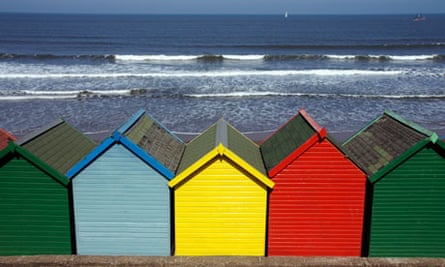
31 Vitamin D deficiency
"Over the last few summers we've seen fewer hours of sunlight, and the crucial thing about Vitamin D is that we get 90% of it from sun exposure," says Dr Carrie Ruxton, of the Health Supplement Information Service. She says that combined with a diet lacking in vitamin D-rich foods such as oily fish means at least 20% of Britons are deficient in vitamin D, which can have an effect on bone health and the immune system.
32 Any umbrellas?
According to Ray Garrett, managing director of Fox Umbrellas, which has been going since 1868, sales are up, "but whether it's because of the weather here, I'm not quite sure because sales are also going up in places like America and Japan." Last year Superdrug reported that sales of brollies were up by 500%, and John Lewis reported selling more than in any other summer.
33 Fabulous fungi
Wet summers should have a beneficial effect on many of Britain's 12,000 species of fungi. "Certainly, drought is bad for a lot of fungi," says Paul Cannon, a mycologist at Kew gardens. "It's rather complicated, and we don't have the data in order to be completely confident about this, but yes, fungi live mostly underground and so they are not dependent on sunlight."
34 Apples and pears
Last year's apple harvest was down 25%, largely because of the bad summer, says Adrian Barlow, chief executive of the trade body English Apples & Pears. "What is really important for us is that we have reasonably warm weather at pollination time at the end of April. Continuous rain and cold weather affects the development of fruits – with very cloudy weather we get fruits at average or below-average size, which will be a feature of this season."
35 The food we eat
Miserable weather calls for comfort food, and where we may once have been eating strawberries and cream, our eating habits already appear to be changing. According to Sainsbury's, sales of hot chocolate and roasting joints are up, 9.2% and 67% respectively, this summer. Porridge is up by 25%.
36 And what we drink …
Would Pimm's lose its appeal during a rainy summer, and what would we drink instead? "A gin and tonic would still work, because it's a bit more fortified," says Tony Conigliaro, mixologist, bar owner and author of Drinks. "I'd suggest slightly stronger drinks like a Manhattan or a martini. If it's really bad weather, then hotter drinks are good, like a toddy."
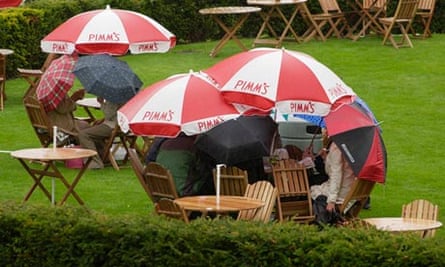
37 Childhood memories
For those of us who remember the long, hot summers of our youth, how certain can we be – short of going back through the weather records – that these memories are accurate? And does that mean there will be a whole generation of children who will remember soggy summers? "There is evidence of a tendency here and in the US to live in a rose-tinted bubble of positive illusions," says psychologist Oliver James. "Asked to recall our childhood summers, we may be inclined to direct the movie in such a way that the sun is always shining."
38 Fake tan sales pale
You'd expect sales of sunscreen to decline, but the wet summer even affects fake tan sales, which saw a drop of more than 20% last year. "The decline in artificial tans over the past year has been a result of both the bad weather and the lack of new products in the market," Ashley Anzie, consumer analyst at Kantar Worldpanel, told The Grocer magazine. "Surprisingly, when we experience poor weather, women are less likely to want to use tanning products."
39 Britons holidaying overseas
Last year's wet summer resulted in a 20% increase in searches on the Thomson website for sunny holidays, with other travel agents reporting similar rises. Research for the Association of British Travel Agents found the main reason for people booking holidays abroad was to see some sunshine.
40 A nation of stoics
If we get into the right mindset, dealing with a decade of disappointing summers could be just what we need to make us more resilient, according to psychotherapist Philippa Perry. If we are not expecting good weather then unexpected sun will be a lovely surprise – and we will take the rain in our stride. "Humans are meaning-making creatures. We love to find reasons for things. It soothes us. If we are able to explain away our existential angst on the weather, it may cheer us up."
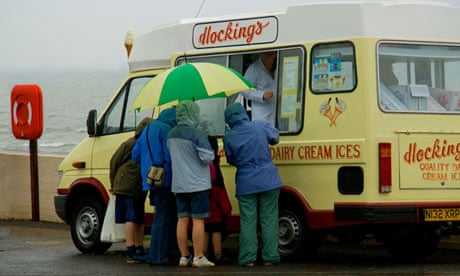

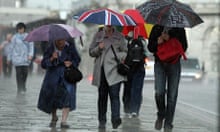
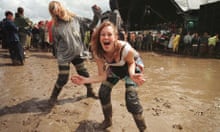
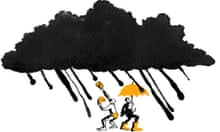

Comments (…)
Sign in or create your Guardian account to join the discussion